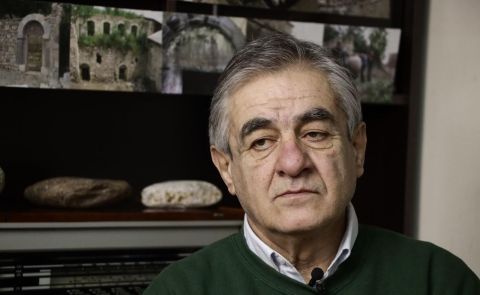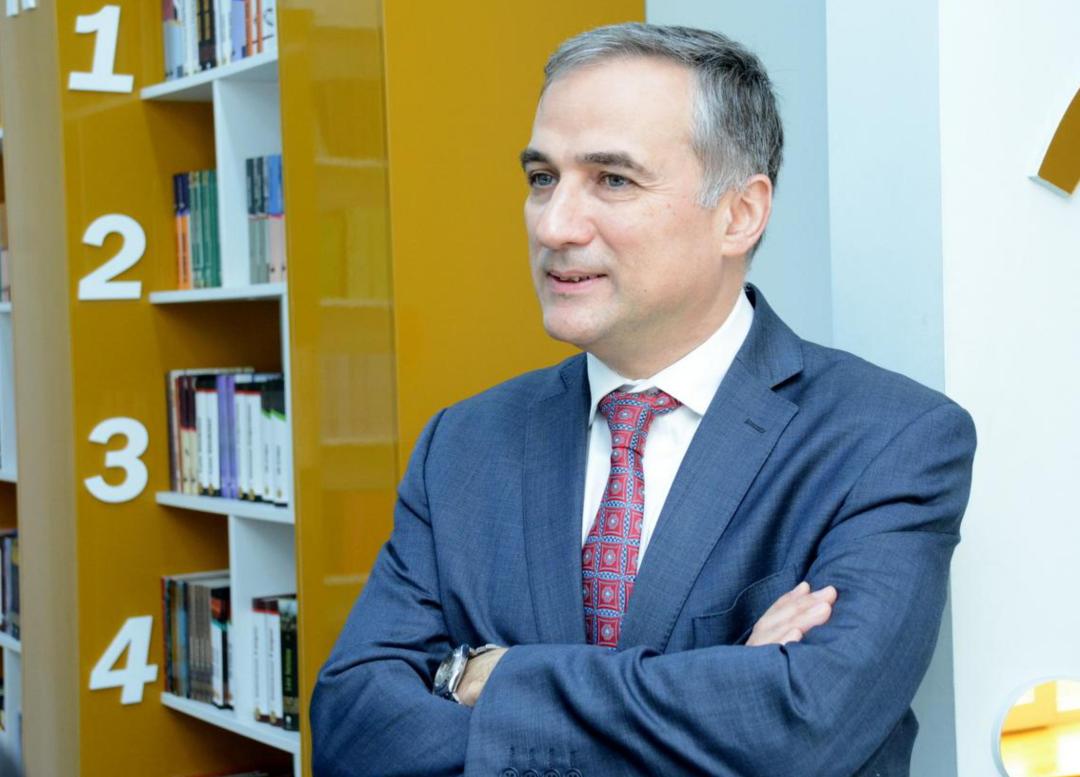
Farid Shafiyev: Baku has no ambition to capture the Zangezur Corridor

Ambassador Farid Shafiyev (PhD) speaks with authority on Azerbaijan’s regional ambitions. He has served in the Political-Military and UN Affairs Divisions of the Foreign Affairs Service of Azerbaijan, rising through the ranks to be appointed Ambassador in Canada (2009) and the Czech Republic (2014). Since February 2019 he is the Chairman of the Centre of Analysis of International Relations in Baku (AIR Centre) in Baku.
Caucasus Watch was invited to take part in a briefing event hosted by the Royal United Services Institute (RUSI) in London, discussing the prospects for regional security after the consolidation of Azerbaijan’s control over Nagorno Karabakh. We reached out to Ambassador Shafiyev after Azerbaijan’s decision not to join the Granada talks on October 5, previously considered a likely milestone in a Azerbaijani-Armenia peace treaty.
The main question at hand is whether missing the Granada rendezvous was a detour or a derailment in a peace process that both Armenia and Azerbaijan expect to be completed by the end of the year. As any escalation could involve Iran, we discuss the matter at length.
During our first meeting, you seemed more positive about the meeting in Granada. Let’s start with the simple question: Is the fact that France was in Granada and Turkey was not the only reason why Azerbaijan missed the appointment in Granada?
We wanted Turkey to be around the table, because we feel that in the presence of France and Germany, we need a counterbalance. Both countries have now openly expressed anti-Azerbaijani views but they did not accept the presence of Turkey in the forum. For us, the presence of France was particularly problematic because days before the meeting in Granada, the French foreign minister visited Armenia, and made comments against Azerbaijan that were unbecoming for a country that wants to play a mediating role.
In any case, after the failure of Granada, the President of the European Council, Charles Michel, invited only President Aliyev and Prime Minister Pashinyan to Brussels. This is an indication that Azerbaijan's position regarding the framework of the talks has been accepted.
So, the negotiating framework is becoming more exclusively bilateral, with the EU playing a facilitating role.
Well, we accept EU mediation, namely the efforts of the President of the European Council, Charles Michel. In the meantime, President Aliyev was in Georgia, where he suggested that Tbilisi should host the next round of negotiations, because Georgia is a regional actor, without the presence of a third party. Again, we do not reject EU mediation.
You seem to be of the view that negotiations have progressed considerably. In substance, what are the remaining bottlenecks in signing off a peace agreement with Armenia.
The situation has changed following Azerbaijan’s restauration of sovereign control over Karabakh. My understanding is that indeed we are close to a peace treaty based on the current draft. There is a small percentage of issues to be negotiated.
Let me be more specific. On the matter of the enclaves, is this a matter of a land-swap or you envisage people actually returning? Why is this item on the table?
Well, it is still on the table because we are still talking about the occupied territory of Azerbaijan and the president has said that this issue also has to find its solution. The two countries pledged to recognise each other's territorial integrity, including Azerbaijan's 86,600 square kilometres. This sovereign territory includes the land of the enclaves based on the 1991 Almaty Declaration. I am not entirely certain how this issue will be resolved, but it will probably be discussed after the signing of the peace treaty. The peace treaty will be a common framework agreement. Then there will be a delimitation process, which will be dealt with by a special committee.
These enclaves are close to the Georgian border. Armenia is a landlocked country. But if you have the Zangezur corridor in the south and the enclaves in the north, one wonders how much of this diplomatic discussion is possible without international guarantees. Do you see Russia maintaining a role as a security guarantor or do you think its role is over?
Well, Russia can only be Armenia's security guarantor. We have no security agreement with Moscow. The presence of Russian peacekeepers in Azerbaijan is temporary. We aim to have no foreign troops on our territory. Whether Armenia wants Russian guarantors is up to Armenia. Azerbaijan has no say in the matter. It is apparent that Russia cannot be removed from the region. The three countries of the South Caucasus have their own approach to this issue. Azerbaijan is trying to balance its own interests with those of external actors, including Russia. We cooperate with Russia without formal security arrangements.
So, there is no chance Russia will be integrated in the future peace agreement with Armenia?
No, I think it will be a strictly bilateral framework between Armenia and Azerbaijan.
And you do not see Iran playing an augmented security role in the future?
No. Iran is always a factor in the region. But I do not think any state in the South Caucasus wants a security arrangement with Iran. Definitely not Azerbaijan.
On the issue of the transport corridor through the Syunik region, which Azerbaijan calls the "Zangezur Corridor". On the basis of the 2020 Trilateral Declaration ending the Second Karabakh War, Azerbaijan has always framed this as a corridor-for-corridor diplomatic issue: thus, Azerbaijan demanded a "Zangezur Corridor" to match the Lachin Corridor. Now that the Lachin Corridor is effectively gone, is the Zangezur Corridor also irrelevant?
Well, it is relevant in the context of regional peace, based on the opening of regional transport and communication links. As specified in the Trilateral Declaration, this includes the connection of the Nakhchivan exclave to Azerbaijan, although the term Zangezur is not explicitly used. Again, this is a matter for diplomatic resolution. The Armenian side is trying to convince the world that Azerbaijan wants to seize Zangezur. This is not true. We believe it would be mutually beneficial, as Armenia would gain a railway link to both the Iranian and Russian networks. If Yerevan does not want this, it will miss out.
I recall that in the 1990s we offered to build our pipeline through Armenia in exchange for the occupied land. This was rejected by Armenia. So, after thirty years, Armenia has no land, no pipelines. If Armenia rejects the transport proposal this time, they will be excluded again, which means that Armenia will be excluded from regional projects. I am afraid this is very likely.
In any case, Azerbaijan has an alternative, which is a route through Iran.
During President Erdoğan's recent visit to Nakhchivan, he stated that 'we will build the Zangezur corridor', and on his return to Ankara he specified that this could be through Iran. So, if I understand correctly, Baku and Ankara agree on this: Zangezur can go through Iran.
If Armenia rejects, then – yes. The transport link will go through Iran.
If I may follow up on this question, there seems to be tension between Azerbaijan and Iran. How do you see the state of Iranian-Azerbaijani relations? Because, on the one hand, we see videos with the Iranian military attaché in Baku present when the Armenian troops in Karabakh laid down their arms, and on the other hand, we saw the mobilisation of Iranian troops along the Armenian border a week earlier, which sent a clear and quite different message. So is there more or less tension between Baku and Tehran after the recent events in Karabakh?
I think we are moving towards de-escalation. I would like to underline that the escalation in September 2021 was an initiative of the Iranian side. The attack on our Embassy in Tehran in January 2023 was on Iranian soil. We did nothing to provoke Iran, but we defend our legitimate national security concerns. Over the last few weeks, we have welcomed signals from Tehran that call for de-escalation. After all, we are neighbours. So we are moving towards de-escalation. Of course, in our region, things can and do change overnight. But I hope that we are indeed on a positive path.
There is an old saying that describes the Israeli-Azerbaijani partnership as an "iceberg relationship", in the sense that three quarters of it is below the surface. I wonder, in the current context, are you concerned that the current escalation in Israel could have a regional spillover?
Despite what is happening now between Israel and Hamas and the Iranian rhetoric, Tehran's intentions are not that transparent. They are, of course, supportive of Hamas and against Israel. That is nothing new. But I am not certain about the extent of their future commitment and their desire for escalation.
Israel and Azerbaijan are allies. That is not new. We condemn terrorism. That goes without saying. There is no justification for massacring civilians. This is fully in line with our historic position in favour of a two-state solution based on Palestinian independence. I see no scope for regional spillover.
So there is a new understanding between Azerbaijan and Iran, and Turkey is fully on board. Recently there was an announcement of a new natural gas pipeline from Turkey to Nakhchivan. Was this about creating a buffer with Iran or facilitating Iranian exports to Turkey, fostering interdependence? Independence or interdependence? Which weighs more?
I do not think Iran is the main issue here. We want a reliable delivery of natural gas. For many years Nakhchivan was under Armenian blockade and we could only secure supplies through the swap deal we have with Iran.
This pipeline provides us with a reliable alternative via our most important ally in the region, Turkey. This is about hedging, supply and demand for natural gas. We have worked with Iran on energy just as we are working with Iran on transport, including the Zangezur corridor if Armenia refuses to engage. The end game is reliable and secured natural gas and regional stability.
Interview conducted by Ilya Roubanis
See Also


Irina Mamulashvili: Electoral Interference is a Playbook, not a Recipe

Giorgi Gakharia: The EU Should Engage Georgia Despite Its Democratic Backsliding

Peace or Capitulation? Shahverdyan on Armenia-Azerbaijan Agreement and the Nagorno-Karabakh Crisis

Ali Mousavi Khalkhali: Iran Will Avoid Conflict in the Caucasus

